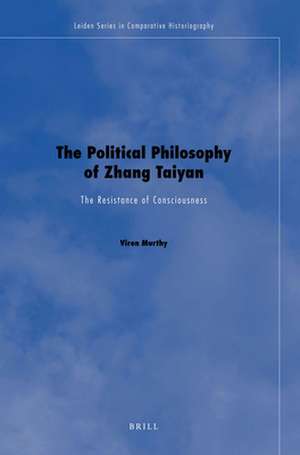The Political Philosophy of Zhang Taiyan: The Resistance of Consciousness: Leiden Series in Comparative Historiography, cartea 4
Autor Viren Murthyen Limba Engleză Hardback – 27 feb 2011
Preț: 705.39 lei
Preț vechi: 860.23 lei
-18% Nou
Puncte Express: 1058
Preț estimativ în valută:
134.97€ • 140.94$ • 111.46£
134.97€ • 140.94$ • 111.46£
Carte indisponibilă temporar
Doresc să fiu notificat când acest titlu va fi disponibil:
Se trimite...
Preluare comenzi: 021 569.72.76
Specificații
ISBN-13: 9789004203877
ISBN-10: 9004203877
Pagini: 266
Dimensiuni: 155 x 235 x 23 mm
Greutate: 0.52 kg
Editura: Brill
Colecția Brill
Seria Leiden Series in Comparative Historiography
ISBN-10: 9004203877
Pagini: 266
Dimensiuni: 155 x 235 x 23 mm
Greutate: 0.52 kg
Editura: Brill
Colecția Brill
Seria Leiden Series in Comparative Historiography
Notă biografică
Viren Murthy, Ph.D (2007) in History, University of Chicago, is assistant professor at the University of Ottawa. He has published articles on Chinese and Japanese intellectual history in journals such as Modern Intellectual History.
Recenzii
“Viren Murthy has now added an insightful study of Zhang as a political philosopher, who through his use of Buddhist and early Daoist philosophy proposed alternatives to the discourse on modernity…Murthy succeeds admirably in presenting the intricacies of Zhang’s thought, and leaves his audience with a bold argument on a genealogy of intellectual thought from Zhang to the present.”
Ihor Pidhainy, Marietta College, The Journal of Asian Studies (May 2012)
"To explain Zhang [Taiyan's] decision, [Viren Murthy] goes back to the source of all modern antinomies...And It is this Western Marxist interpretation of Zhang Taiyan that makes Murthy's book a ground-breaking work of comparative philosophy."
Tze-ki Hon, State University of New York-Geneseo, Monumenta Serica 59 (2011)
“Viren Murthy's book is a sophisticated piece of intellectual history that dissects the early formation of Chinese critiques of capitalism in the global context. This topic is both timely and important. The book represents a serious effort to analyze the integration of Buddhism into the history of modern Chinese thought and philosophy."
Hung-yok Ip, Oregon State University, Modern Chinese Literature and Culture, November 2012
"Viren Murthy's study of Zhang Taiyan's (1869-1936) political thought is an engaging work that will challenge sinologists to think about its subject in new ways...[It] advances original arguments, not just about Zhang and his place in Chinese history, but about trends in modern Chinese politics, philosophy and cultural criticism...The volume deserves a wide readership for these reasons."
Scott Pacey, The Hebrew University of Jerusalem, New Zealand Journal of Asian Studies Vol. 14 No. 2 (December 2012)
Ihor Pidhainy, Marietta College, The Journal of Asian Studies (May 2012)
"To explain Zhang [Taiyan's] decision, [Viren Murthy] goes back to the source of all modern antinomies...And It is this Western Marxist interpretation of Zhang Taiyan that makes Murthy's book a ground-breaking work of comparative philosophy."
Tze-ki Hon, State University of New York-Geneseo, Monumenta Serica 59 (2011)
“Viren Murthy's book is a sophisticated piece of intellectual history that dissects the early formation of Chinese critiques of capitalism in the global context. This topic is both timely and important. The book represents a serious effort to analyze the integration of Buddhism into the history of modern Chinese thought and philosophy."
Hung-yok Ip, Oregon State University, Modern Chinese Literature and Culture, November 2012
"Viren Murthy's study of Zhang Taiyan's (1869-1936) political thought is an engaging work that will challenge sinologists to think about its subject in new ways...[It] advances original arguments, not just about Zhang and his place in Chinese history, but about trends in modern Chinese politics, philosophy and cultural criticism...The volume deserves a wide readership for these reasons."
Scott Pacey, The Hebrew University of Jerusalem, New Zealand Journal of Asian Studies Vol. 14 No. 2 (December 2012)
Cuprins
Table of Contents
Acknowledgments
Chapter One: Introduction: Zhang Taiyan and Chinese Modernity
Chapter Two: Zhang’s Critique of Kang Youwei: Anti-Manchuism, the National Essence, and Revolution
Chapter Three: Buddhist Epistemology and Modern Self-Identity: ZhangTaiyan’s “On Establishing Religion”
Chapter Four: Transfiguring Modern Temporality: Zhang Taiyan’s Critique of Evolutionary History
Chapter Five: Daoist Equalization Against the Universal Principle: Zhang Taiyan’s Critique of Late Qing Political Theory
Conclusion: Zhang Taiyan, Lu Xun and Wang Hui: The Politics of Imagining a Better Future
Acknowledgments
Chapter One: Introduction: Zhang Taiyan and Chinese Modernity
Chapter Two: Zhang’s Critique of Kang Youwei: Anti-Manchuism, the National Essence, and Revolution
Chapter Three: Buddhist Epistemology and Modern Self-Identity: ZhangTaiyan’s “On Establishing Religion”
Chapter Four: Transfiguring Modern Temporality: Zhang Taiyan’s Critique of Evolutionary History
Chapter Five: Daoist Equalization Against the Universal Principle: Zhang Taiyan’s Critique of Late Qing Political Theory
Conclusion: Zhang Taiyan, Lu Xun and Wang Hui: The Politics of Imagining a Better Future












